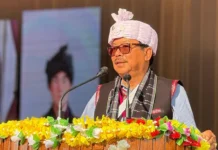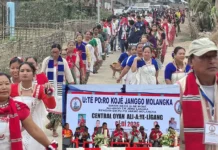Battle of Limeking
Flights Of Fantasy
[ M Panging Pao ]
Many Arunachali veterans and old-timers recall the 1962 Indo-Chinese conflict with fear and anger. It is a known fact that the Chinese forces entered deep into Arunachal Pradesh along many axes. The main axes of penetration by the Chinese forces were the Tawang-Bomdila-Rupa axis, the Taksing-Limeking axis, the Mechuka/Manigong-Tato axis, the Gelling-Tuting axis, and the Kibithoo-Walong axis. Though the Chinese forces penetrated without major opposition in most axes, many fierce battles were fought by a few units and small groups of soldiers, sometimes supported by the local population. Many readers in Arunachal Pradesh and in our country are not aware of these fierce battles fought by our brave soldiers; many of these brave soldiers remain unknown and unsung.
Havildar Shere Thapa of 2 Jammu & Kashmir Rifles was part of a protective patrol of one platoon strength located near Rio bridge to keep watch on Chinese movement and delay its advance for maximum duration. Rio bridge was the main link onwards to Limeking from Taksing.
On 18 November, 1962, about 200 Chinese soldiers came in contact with the protective patrol.
Havildar Shere Thapa was manning a light machine gun located at a vantage point, and was covering the advance of the Chinese troops. The buddy partner of the light machine gun detachment was seriously injured in the firefight which commenced thereafter.
Havildar Shere Thapa single-handedly manned the light machine gun, occupying a well-camouflaged vantage position, and faced waves of Chinese assault launched one after the other. He kept on firing with his light machine gun till he ran out of ammunition.
This gallant action of Havildar Shere Thapa delayed the Chinese advance for nearly 72 hours. In this encounter 70 Chinese soldiers, including a senior officer, were reported to be killed.
The brave action of Havildar Shere Thapa won the hearts of the locals of the area, who still hold him in high esteem. Even the Chinese recognized his bravery. They buried his dead body on the spot and kept a wooden epitaph near his body with an inscription in Chinese script appreciating the fighting qualities of Havildar Shere Thapa.
A memorial in the memory of Havildar Shere Thapa for his indomitable courage and supreme sacrifice was made by the locals of that area, which stands near Kete Nallah near Limeking even today.
There are very few instances of local population building memorials for unknown soldiers with their own resources. There are even rarer instances wherein the enemy recognizes a soldier’s bravery and leaves behind an epitaph in his honour.
Though he was not decorated by the nation, such was the legend of Havildar Shere Thapa that his bravery was recognized and honoured by the enemy and the local population! The battle of Limeking has found mention in the golden pages of our history. (The contributor is retired Group Captain, Indian Air Force)




